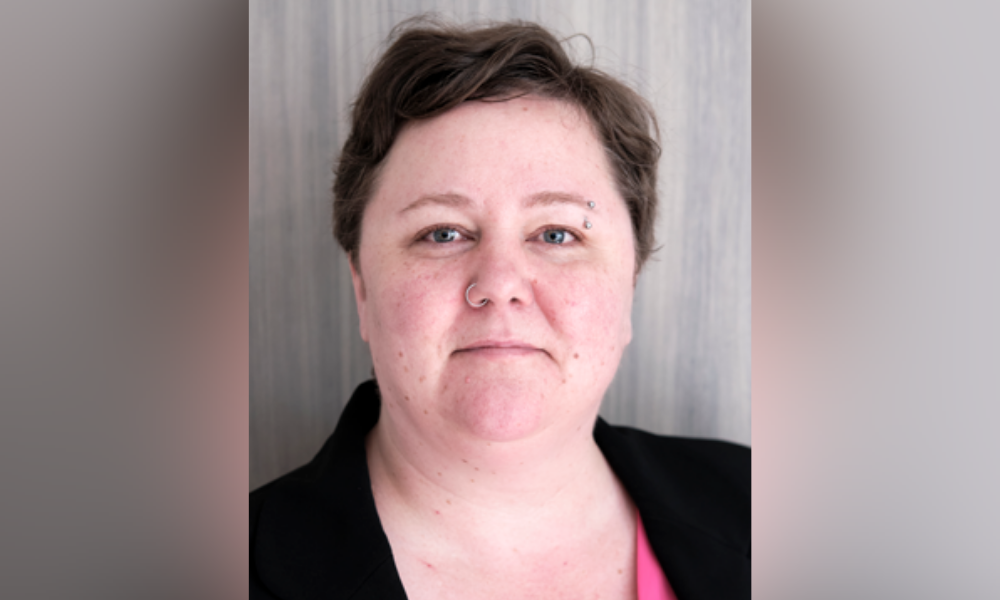
Crown counsel Clare Jennings enjoys being on the frontline of public interest law

As the new president of the British Columbia branch of the Canadian Bar Association, Clare Jennings, puts it, improv comedy is perhaps one of the best types of training for life in the courtroom.
What improv does, says Jennings, is to “teach you to listen and to think on your feet,” and to respond to what witnesses are saying rather than thinking of the next question you plan to ask. These qualities are essential to being a barrister, she says, “and I’m a barrister at heart.”
Indeed, Jennings has been a provincial Crown counsel in Victoria and Colwood since her 2008 call to the bar. So, legal hearings and trials (whether in a courtroom or remotely, thanks to the COVID-19 pandemic) are an almost daily experience. Her improv background comes in handy for her work as a Crown lawyer. “It really appealed to me, because Crown work really is frontline public interest law.”
Jennings was born in Smithers, B.C. but also spent a lot of her youth in Saskatchewan. She notes that she started doing improv in high school and continued it while in university. (She has a bachelor’s degree and a master’s degree in history from McGill and went to law school at the University of Victoria.) She even joined professional improv troupes – Without Annette in Montreal and The Impromaniacs in Montreal.
While her various roles with the CBA in B.C., along with other volunteer work, have kept her off the improv circuit for the last few years, Jennings says she is excited about becoming president of the bar association branch during a critical time for the legal profession. She points out that during the last 18 months of the pandemic, the CBABC has become an “indispensable asset and source of essential, up-to-date information for the legal community.
“I want to build on that by connecting with lawyers across the province to learn about the unique challenges and opportunities they face in their work.”
A CBA member since 2006, Jennings has been involved as an executive of the CBABC Criminal Justice-Victoria Section and served on several committees, including the Access to Justice committee and the Rural Education and Access to Lawyers Initiative Advisory group. On her path to the presidency, she served on the CBABC board since 2018 as director, secretary-treasurer and first vice president.
The Canadian Bar Association is the professional organization representing more than 36,000 lawyers, judges, and law students across Canada. The group has more than 7,300 members in British Columbia. Jennings is serving a one-year term for 2021-2022.
Jennings says that the pandemic has resulted in a lot more video and telephone appearances. That has some big advantages, especially for bail hearings. It keeps people in their communities rather than at a regional detention centre or on bail but not in their home community.
At the same time, there have been some technical challenges, with the lack of high-speed internet in some Indigenous communities as one example. Those representing themselves may also feel they don’t have the tools they need to deal with their case. Some people, for instance, might only have cell phones with a certain number of minutes and can’t stay on hold for long, Jennings says.
“There are definitely some problems that need to be worked out,” she says. “But we’re moving in the direction of increased access. And that’s what’s important.” Jennings adds she also expects many of the practices developed during the pandemic will remain after things return “to normal.”
Jennings points to the CBABC Agenda for Justice, report which offers concrete suggestions where the legal community and the B.C. Government can work collaboratively. It has more than 40 recommendations in 22 key areas that address everyday situations affecting people in B.C.—families undergoing a separation, Indigenous peoples, small businesses, rural communities without access to basic legal services, and more.
“Access to justice is important,” she says. “So, we continue to work with our members and advocate with government to identify new ways to increase access to justice.”
Another area that Jennings says the B.C. branch of the CBA will focus on is any issue related to diversity and inclusion in all its forms. That includes First Nations, people of colour, gender, the LTBGQ+ community, and those with disabilities. "Our association is actively committed to making the profession and the practice of law more inclusive and accessible to all," she says.
“What diversity and inclusion means to me is that every person can look at the legal profession and say ‘that is a place where I can feel welcome.’” The branches of the CBA can participate in ways to achieve this goal "by gathering the facts and data and provide that information to those bodies that can make the appropriate changes.”
The other role is advocacy, she says. “I think that that is an important role for CBA and the CBABC,” she says, as well as “leading by example.” That means creating “culturally safe spaces” for meetings, introducing people with their preferred pronouns, acknowledging lands of First Peoples, and ensuring that meetings are held in spaces that are physically accessible.
Jennings notes that she “learned a lot” from being the “different” person in a community when she lived in Ghana with her parents, who were doing international aid work. She was 11 at the time.
“The sense of not fitting in, of being obviously visibly different, is one of my strongest memories,” she says. However, she acknowledges that in “no way means that I know what it is like to be a visible minority in Canada.”
But the feeling of being an outsider, even though a “privileged” outsider, “was a valuable lesson.”